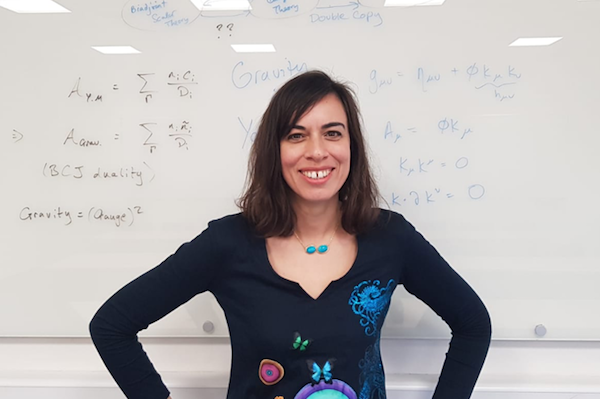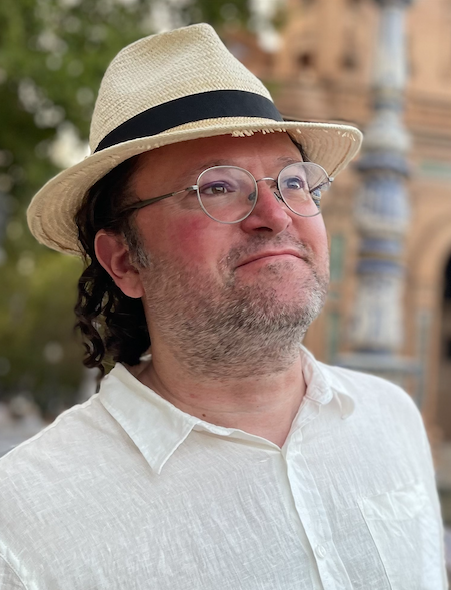Study options
- Starting in
- September 2025
- Location
- Mile End
- Fees
- Home: £7,900
Overseas: £16,450
EU/EEA/Swiss students
The course fee is charged per annum for 2 years. Note that fees may be subject to an increase on an annual basis - see details on our tuition fees page.
What you'll study
You’ll deepen your understanding of your specialism (either physics, astrophysics, theoretical physics or particle physics) in your first year by choosing modules from a wide variety of topics at the forefront of fundamental and applied physics research. This is a highly flexible programme that can be tailored to your specialist interests as you develop them - you will be able to choose modules in a variety of study areas offered by the School, including growth areas such as Machine Learning.
You can choose to study modules available on each pathway below:
In your second year, you’ll join one of our research groups - which may include working in a research laboratory such as CERN or RAL. We’ll put you in contact with a member of that research group to decide your precise research topic before you arrive. We have four main research centres:
- Centre for Theoretical Physics
- Particle Physics Research Centre
- Astronomy Unit
- Centre for Condensed Matter Physics
This programme is available within the South East Physics university network (SEPnet) - and can be studied through any of the universities within the network, or through two of the universities. This means you can apply to spend your first or second year with Queen Mary or to spend both years with us. The Institute where you spend your second year will award your EuroMasters degree. State your preferred combination in your application.
You’ll benefit from the combined expertise of SEPnet’s universities through SEPnet events and GRADnet, the largest physics postgraduate school in England.
You can view a series of videos created by the academics involved in the MSc programme that cover varied aspects of their research and how our research intersects with the teaching you'll receive and the modules you'll study.
Additional costs
As a EuroMasters student, it may be possible for you to spend the second year in a research lab such as CERN or RAL or at a different SEPnet institution. If you do so, you'll need to organise and pay for your travel arrangements.
The School may be able to assist with costs involved in studying elsewhere assessed on an individual basis.
Structure
This programme is structured into three different study pathways: Theoretical Physics, Particle Physics and Astrophysics.
To obtain your MSc Physics EuroMasters degree you will need to complete:
- Eight elective taught modules (120 credits)
- Research project (120 credits; approximately 15,000-20,000 words)
If you choose to leave the MSc at the end of your first year without completing a research project, you may be awarded a Physics (Euromasters) PGDip.
Compulsory/Core Elective modules
Students will develop design, experimental, computational or analytical skills through the independent study of a problem in physics. They will learn to write a scientific report summarising results of an independent investigation, placing them in a physics context, and detailing the methods used and the results obtained. The project will run through both semesters and will involve a report and an oral presentation.
Elective modules
Relativistic wave equations for particles of various spins will be derived and studied, and the physical interpretations of their solutions will be analysed. After an introduction to classical field theory, and the role of symmetries in field theory (including the beautiful Noether's theorem) students will learn the fundamental concepts of quantum field theory, including the quantisation of the free Klein-Gordon and Dirac fields and the derivation of the Feynman propagator. Interactions are introduced and a systematic procedure to calculate scattering amplitudes using Feynman diagrams is derived. We will also compute some explicit tree-level scattering amplitudes in a number of simple examples.
"Stars are important constituents of the universe. This module starts from well known physical phenomena such as gravity, mass conservation, pressure balance, radiative transfer of energy and energy generation from the conversion of hydrogen to helium. From these, it deduces stellar properties that can be observed (that is, luminosity and effective temperature or their equivalents such as magnitude and colour) and compares the theoretical with the actual. In general good agreement is obtained but with a few discrepancies so that for a few classes of stars, other physical effects such as convection, gravitational energy generation and degeneracy pressure have to be included. This allows an understanding of pre-main sequence and dwarf stages of evolution of stars, as well as the helium flash and supernova stages."
Radiative transfer describes the emission and propagation of light. In this course students will learn how we use radiative transfer to infer the properties and evolution of distant objects from light alone. They will also learn how light influences the temperature and motion of matter. Light also affects the composition of astrophysical systems which naturally links the course to an introduction to astrochemistry. This module provides a key toolkit for most observational and theoretical astrophyiscs.
The aim of this course is to complement the core Relativistic Waves and Quantum Fields (RWQF) module by providing the student with some advanced tools essential for research in modern Theoretical Physics. Using the same starting point as RWQF, Maxwell's theory of electromagnetism, we will focus on the Lagrangian formulation of the two most prominent theories of our time: Yang-Mills (gauge) theory and gravity. The alternative notation of differential forms will be explored and the geometric aspects of gauge theory emphasised. Building on this, and introducing elements from group theory and fibre bundles we will introduce classical solitons as localised, finite energy solutions to the classical field equations in various dimensions (kinks in 2d, vortices in 3d, monopoles in 4d, instantons in Euclidean 4d) and discuss their properties, including the existence of zero-modes, associated collective coordinates and moduli spaces.
This module covers advanced concepts of modern cosmology, and in particular will introduce the student to cosmological perturbation theory. It discusses the observed structure of the universe, how these structures formed, and how they can be used to test our theories and models of the universe. The module will also discuss recent and upcoming experiments and large scale structure surveys and their relevance for cosmology.
This module gives a broad exposition of the modern framework for the unification of special relativity and quantum theory - relativistic quantum field theory (QFT). Lagrangian formulation and canonical quantisation of free fields with spin = 0, 1/2, 1 are revised. The construction of interacting quantum field theories is devoloped with special focus on phi^4-theory and quantum electrodynamics (QED). Perturbation theory in terms of Feynman diagrams is developed systematically, and important concepts such as regularisation and renormalisation are introduced. These tools are applied to the calculation of simple tree-level and one-loop S-matrix elements and cross-sections in phi^4 theory and QED, corrections to the electron magnetic moment and the running coupling. The course will also touch on more advanced topics such as anomalies, non-Abelian gauge theories, and modern methods for the calculation of S-matrix elements.
"A plasma is an ionized gas where the magnetic and electric field play a key role in binding the material together. Plasmas are present in almost every astrophysical environment, from the surface of pulsars to the Earth's ionosphere. This module explores the unique properties of plasmas, such as particle gyration and magnetic reconnection. The emphasis is on the plasmas found in the Solar System, from the solar corona and solar wind to the outer reaches of the heliosphere and the interstellar medium. Fundamental astrophysical processes are explored, such as the formation of supersonic winds, magnetic energy release, shock waves and particle acceleration. The module highlights the links between the plasmas we can observe with spacecraft and the plasmas in more distant and extreme astrophysical objects."
"Ever since the dawn of civilization human beings have speculated about the existence of planets outside of the Solar System orbiting other stars. The first bona fide extrasolar planet orbiting an ordinary main sequence star was discovered in 1995, and subsequent planet searches have uncovered the existence of more than one hundred planetary systems in the Solar neighbourhood of our galaxy. These discoveries have reignited speculation and scientific study concerning the possibility of life existing outside of the Solar System. This module provides an in depth description of our current knowledge and understanding of these extrasolar planets. Their statistical and physical properties are described and contrasted with the planets in our Solar System. Our understanding of how planetary systems form in the discs of gas and dust observed to exist around young stars will be explored, and current scientific ideas about the origin of life will be discussed. Rotationally supported discs of gas (and dust) are not only important for explaining the formation of planetary systems, but also play an important role in a large number of astrophysical phenomena such as Cataclysmic Variables, X-ray binary systems, and active galactic nuclei. These so-called accretion discs provide the engine for some of the most energetic phenomena in the universe. The second half of this module will describe the observational evidence for accretion discs and current theories for accretion disc evolution."
This course introduces core concepts in supersymmetry that can be applied to quantitatively understand a broad variety of physical systems and is a complement to the AQFT and FMQFT modules. Starting with supersymmetric quantum mechanics as a toy model, the course covers the supersymmetry algebra, its representations, the Witten Index, and the resulting constraints on quantum dynamics. We then move on to introduce supersymmetric field theories in three space-time dimensions consisting of scalars and fermions while giving a basic introduction to symmetry currents, the classical and quantum Wilsonian renormalization group flow, moduli spaces, spurions, and non-renormalization arguments. The course culminates in a study of simple dualities in three-dimensional supersymmetric abelian gauge theories. We conclude with a discussion of supersymmetry in four space-time dimensions and, time permitting, the embedding of our constructions in string theory.
The module will cover the basics of string theory, and provide an introduction to the perturbative formulation of string theories. The topics that we will cover include the classical physics of strings, and the quantisation of bosonic and superstrings, perturbative aspects of D-branes, duality symmetries, and two-dimensional conformal field theory and its application to string theory. A brief discussion on some advanced topics in string theory will be given towards the end of the module.
Machine learning influences modern life through many different avenues and is silently revolutionising the way we live and work. We can see the influence of machine learning algorithms in social media, web search engines, mobile device spell checkers and self-driving cars. This module provides an introduction to machine learning using the Python programming language and the TensorFlow (TM) programming toolkit from Google (TM). Minimal programming background is assumed, however students wishing to take this module should be familiar with using computers, and mathematics at a level commensurate with a BSc in Physics or equivalent degree (calculus and linear algebra).
Assessment
- 50% Modules
- 50% Research project
- Most modules are assessed by a final exam and coursework
- If you attend another SEPnet institution in your second year, assessment criteria and methods may differ
- Your research project is assessed by a final written report, a student presentation and oral examination and on your performance during the project
Research project
You’ll write a final report on your research project with approximately 15,000-20,000 words, during your second year. This research project forms a major component of your degree and is excellent preparation for doctoral study.
Recent research report titles have included:
- Analysis of optimal outer detector clustering algorithm and the identification of ideal outer detector configuration for the Hyper-Kamiokande experiment
- Double copy duality in classical gravity and gauge theories
- Hubble Tension and Backreaction
- Hydrothermal Synthesis
- Inflationary Cosmology: Analysing Higgs Inflation and the Challenges of the Hot Big Bang Model
- Recursion relations of integrated correlators in N = 4 SYM and their modular representation
- Superstring amplitudes from Bern-Carrasco-Johansson (BCJ) numerators at one loop

—The length of time enabled proper investigation of a fascinating research problem, culminating in new results and ultimately publication. During this time, my supervisor and I also got to know each other better. Not only did I get the chance to experience what academic research is like and network with academics, but my supervisor was also able to assess my research skills. I believe that this could only serve to provide a very rich reference letter in PhD applications.
Nadia Bahjat-Abbas, MSc Theoretical Physics (Euromasters), 2017
Teaching
Most of this MSc is taught in lectures. We have small class sizes and you’ll have ample access to teaching staff during their scheduled office hours.
You’ll have three hours of lectures per module and normally four taught modules per semester. You’ll also undertake a large amount of personal study, reading widely around your subject.
Your research project will require personal research, undertaken independently under the guidance of your academic supervisor.
You’ll also benefit from the combined expertise of SEPnet’s universities through video conferencing and SEPnet events.
You’ll be assigned an Academic Adviser who will guide you in both academic and pastoral matters throughout your time at Queen Mary. You’ll also gain additional support from your research project supervisor.
Where you'll learn
Facilities
- Newly refurbished communal social space for the Theoretical Physics group
- Newly refurbished seminar room facilities on the 6th floor
- Mission data from Queen Mary Collaborations such as ALMA, LIGO, JWST and the Parker Solar Probe
- Our Astronomical Observatory
- High performance computing facilities such as our local supercomputer and the national DiRAC facility.
- Experimental facilities, such as clean rooms, workshops and laboratories
Campus
Your postgraduate learning experience is enhanced by our fantastic location in Mile End, in east London.
We are fortunate enough to be close to the Central, District and Hammersmith and City lines, so you’ll have easy access to materials in the University of London Library at Senate House, the individual libraries of the various colleges of the University of London, as well as the specialist library of the Royal Astronomical Society. The outstanding collections at the British Library are also close at hand.
The School takes advantage of its London location and our excellent transport links to attract an impressive range of visitors, seminar speakers and to facilitate our international research network, so you can develop your studies within a global context.
About the School
School of Physical and Chemical Sciences
The School of Physical and Chemical Sciences (SPCS) is known for its world-leading research, and you’ll be learning from scientists at the forefront of their field. We’re also known for our outstanding teaching, which was recognised with a LearnSci Teaching Innovation award in 2021.
We’re a friendly, international and intellectually-curious community. And we’re looking forward to helping you thrive in your area of study and research.
Career paths
This programme is recognised by European employers and is accepted by the European Credit Transfer Accumulation System (ECTS) – so you can take up a career in physics or study for a PhD in many different countries. ECTS has been adopted by most of the countries in the European Higher Education Area as the national credit system and is increasingly used elsewhere.
We have an excellent track record in preparing students for PhD places at high-ranking institutions. Our graduates have gone on to pursue PhD study at institutions including:
- Harvard University
- King’s College London
- Stony Brook University, New York
- University of Oxford
- University College London
Recent graduates of our MSc programmes have also gone on to positions in the industry such as:
- Business and data analyst
- Consultant
- Data scientist
- Programming analyst
- 95% of PGT and PhD graduates are in employment or further study 6 months after graduating (Graduate Outcome Survey 2021)
Fees and funding
Full-time study
September 2025 | 21 months
- Home: £7,900
- Overseas: £16,450
EU/EEA/Swiss students
Conditional deposit
Home: Not applicable
Overseas: £2000
Information about deposits
Queen Mary alumni can get a £1000, 10% or 20% discount on their fees depending on the programme of study. Find out more about the Alumni Loyalty Award
Funding
There are a number of ways you can fund your postgraduate degree.
- Scholarships and bursaries
- Postgraduate loans (UK students)
- Country-specific scholarships for international students
Our Advice and Counselling service offers specialist support on financial issues, which you can access as soon as you apply for a place at Queen Mary. Before you apply, you can access our funding guides and advice on managing your money:
Entry requirements
UK
Degree requirements
A good 2:2 (55% or above) or above at undergraduate level in Physics.
Other routes
Applicants with a 2:2 degree (50% or above) will be considered on an individual basis.
Other education backgrounds can be considered subject to demonstrating satisfactory knowledge of physics.
Additional information
Please note that this programme may require ATAS, find out more here: https://www.qmul.ac.uk/welfare/visas-international-advice/visas-for-study/atas/
Find out more about how to apply for our postgraduate taught courses.
International
English language requirements
The English language requirements for our programmes are indicated by English bands, and therefore the specific test and score acceptable is based on the band assigned to the academic department within which your chosen course of study is administered. Note that for some academic departments there are programmes with non-standard English language requirements.
The English Language requirements for entry to postgraduate taught and research programmes in the School of Physical and Chemical Sciences falls within the following English band:
Band 4: IELTS (Academic) minimum score 6.5 overall with 6.0 in each of Writing, Listening, Reading and Speaking
We accept a range of English tests and qualifications categorised in our English bands for you to demonstrate your level of English Language proficiency. See all accepted English tests that we deem equivalent to these IELTS scores.
Visas and immigration
Find out how to apply for a student visa.
If you're an international student you'll need to get ATAS (Academic Technology Approval Scheme) approval, which will extend the visa application process by 2-4 weeks. Find out more about ATAS










